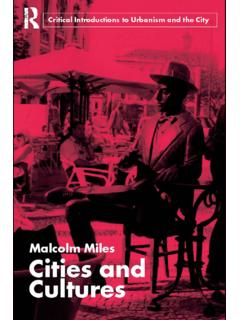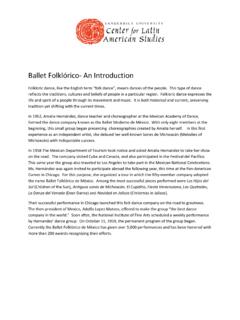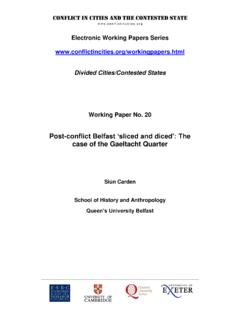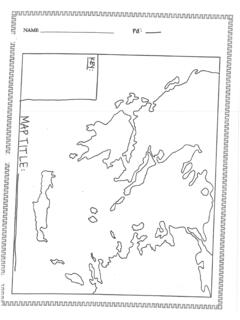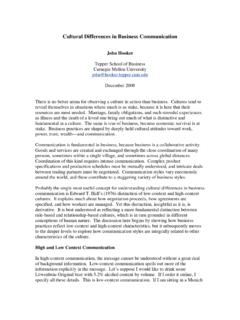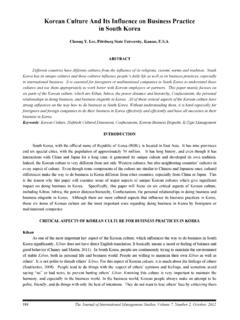Transcription of A Global Sense of Place - aughty.org
1 A Global Sense of Place Doreen MasseyThis is an era - it is often said - when things are speeding up, and spreading out. Capital is going through a new phase of internationalization, especially in its financial parts. More people travel more frequently and for longer distances. Your clothes have probably made in a range of countries from Latin America to South-East Asia. Dinner consists of food shipped in from all over the world. And if you have a screen in your office, instead of opening a letter which - care of Her Majesty's Post Office - has taken some days to wend its way across the country, you now get interrupted by e- view of the current age is one now frequently found in a wide range of books and journals.
2 Much of what is written about space, Place and postmodern times emphasizes a new phase in what Marx once called 'the annihilation of space by time'. The process is argued, or - more usually - asserted, to have gained a new momentum, to have reached a new stage. It is a phenomenon which has been called 'time-space compression'. And the general acceptance that something of the sort is going on the marked by the almost obligatory use in the literature of terms and phrases such as speed-up, Global village, overcoming spatial barriers, the disruption of horizons, and so of the results of this is an increasing uncertainty about what we mean by 'places' and how we relate to them.
3 How, in the face of all this movement and intermixing, can we retain any Sense of a local Place and its particularity? An (idealized) notion of an era when places were (supposedly) inhabited by coherent and homogeneous communities is set against the current fragmentation and disruption. The counterposition is anyway dubious, of course; ' Place ' and 'community' have only rarely been coterminous. But the occasional longing for such coherence is none the less a sign of the geographic fragmentation, the spatial disruption, of our times. And occasionally, too, it has been part of what has given rise to defensive and reactionary responses - certain forms of nationalism, sentimentalized recovering of sanitized'heritages', and outright antagonism to newcomers and 'outsiders'.
4 One of the effects of such responses is that Place itself, the seeking after a Sense of Place , has come to be seen by some as necessarily is that necessarily so? Can't we rethink our Sense of Place ? Is it not possible for a Sense of Place to be progressive; not self-closing and defensive, but outward-looking? A Sense of Place which is adequate to this era of time-space compression? To begin with, there are some questions to be asked about time-space compression itself. Who is it that experiences it, and how? Do we all benefit and suffer from it in the same way?
5 For instance, to what extent does the current popular characterization of time-space compression represent very much a western, colonizer's, view? The Sense of dislocation which some feel at the sight of a once well-known local street now lined with a succession of cultural imports - the pizzeria, the kebab house, the branch of the middle-eastern bank - must have been felt for centuries, thought from a very different point of view, by colonized peoples all over the world as they watched the importation, maybe even used, the products of, first, European colonization, maybe British (from new forms of transport to liver salts and custard powder)
6 , later US, as they learned to eat wheat instead of rice or corn, to drink Coca-Cola, just as today we try out , as well as querying the ethnocentricity of the idea of time-space compression and its current acceleration, we also need to ask about its causes: what is it that determines our degrees of mobility, that influences the Sense we have of space and Place ? Time-space compression refers to movement and communication across space, to the geographical stretching-out of social relations, and to our experience of all this. The usual interpretation is that it results overwhelmingly from the actions of capital, and from its currently increasing internationalization.
7 On this interpretation, then, it is time space and money which make the world go around, and us go around (or not) the world. It is capitalism and its developments which are argued to determine out understanding and out experience of surely this is insufficient. Among the many other things which clearly influence that experience, there are, for instance, 'race' and gender. The degree to which we can move between countries, or walk about the streets at night, or venture out of hotels in foreign cities , is not just influenced by 'capital'. Survey after survey has shown how women's mobility, for instance, is restricted - in a thousand different ways, from physical violence to being ogled at or made to feel quite simply 'out of Place ' - not by 'capital', but by men.
8 Or, to take a more complicated example, Birkett, reviewing books on women adventurers and travellers in the nineteenth and twentieth centuries, suggests that 'it is far, far more demanding for a woman to wander now than ever before'. The reasons she gives for this argument are a complex mix of colonialism, ex-colonialism, racism, changing gender relations and relative wealth. A simple resort to explanation in terms of 'money' or 'capital' alone could not begin to get to grips withthe issue. The current speed-up may be strongly determined by economic forces, but it is not the economy alone which determines our experience of space and Place .
9 In other words, and put simply, there is a lot more determining how we experience space than what 'capital' gets up is more, of course, that last example indicated that 'time-space compression' has not been happening for everyone in all spheres of activity. Birkett again, this time writing of the Pacific Ocean: "Jumbos have enabled Korean computer consultants to fly to Silicon Valley as if popping next door, and Singaporean entrepreneurs to reach Seattle in a day. The border of the world's greatest ocean have been joined as never before. And Boeing has brought these people together.
10 But what about those they fly over, on their islands five miles below? How has the mighty 747 brought them greater communion with those whose shores are washed by the same water? It hasn't, of course. Air travel might enable businessmen to buzz across the ocean, but the concurrent decline in shipping has only increased the isolation of many island communities .. Pitcairn, like many other Pacific islands, has never felt so far from its neighbours."In other words, and most broadly, time-space compression needs differentiating socially. this is not just a moral or political point about inequality, although that would be sufficient reason to mention it; it is also a conceptual for a moment that you are on a satellite, further out and beyond all actual satellites; you can see 'planet earth' from a distance and, unusually for someone with only peaceful intentions, you are equipped with the kind of technology which allows you to see the colours of people's eyes and the numbers on their number plates.

